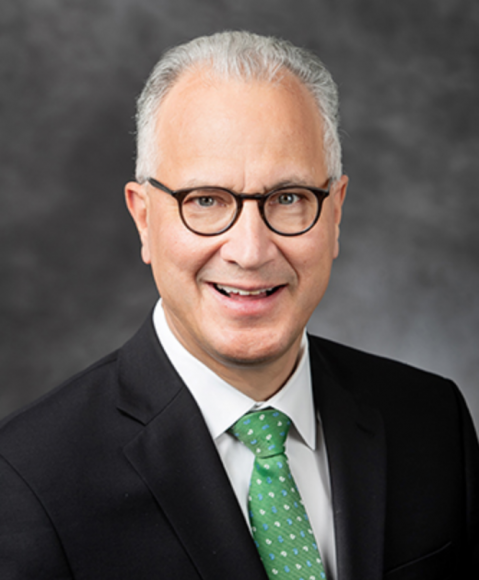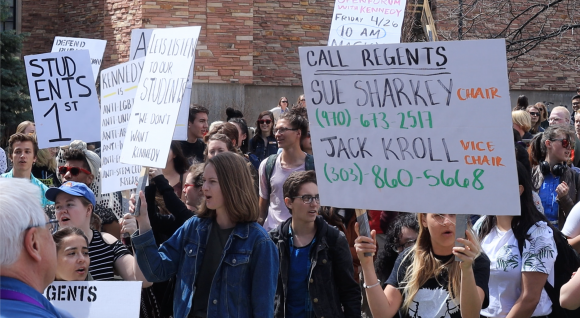
UND President Mark Kennedy. Photo courtesy of University of North Dakota
As criticism of Mark Kennedy continues to increase, two members of the Board of Regents have stated that they will vote against confirming him as the next University of Colorado president come May 2.
Irene Griego, a Democrat, announced on Friday that she will vote against Kennedy’s appointment. Griego was one of the two regents on the presidential search committee.
“In the two weeks since we announced Mark Kennedy as our sole finalist for president of the university, I have heard from thousands of Coloradans including students, faculty, parents, community members and organizations,” Griego said in an open letter that was shared with the CU Independent. “The vast majority have expressed sincere, heartfelt concerns that Mr. Kennedy’s selection will neither enhance our university’s progress nor foster our diversity efforts to protect the well-being of students of color, the LGBTQ community or students with different ideas and backgrounds.”
Griego goes on to state that Regents listening to diverse voices in the CU community “is critical.” Griego said that CU needs a president who will unite and that it is the responsibility of Regents to demonstrate “collaboration and shared governance.”
“We have a difficult and critical charge to choose a president that will lead the University of Colorado into the best possible future,” Griego wrote. “I believe that working together, we can accomplish our goals.”

A heated crowd questions CU presidential finalist Mark Kennedy. April, 26, 2019 (Hunter Allen / CU Independent)
On Sunday, the University of Colorado Faculty Council released a report alleging that Kennedy had engaged in ethical misconduct that was incompatible with the university’s core values. The report claims that Kennedy “mislead” the presidential search committee, the Regents and the CU community at large by presenting “inaccurate information about his accomplishments on his CV; omitting information from his CV; and making misleading or entirely inaccurate claims while on [CU] campuses.”
“This behavior demonstrates an inability to adhere to CU’s clearly articulated and most fundamental ethical standards,” the report reads. “This behavior alone should end his candidacy.”
Kennedy is alleged to have misrepresented his political activity since leaving Congress and misrepresented policies at UND, including the extent of his work with tribal colleges in North Dakota, UND’s Title IX policies (the university is currently being sued for Title IX violations) and UND’s graduation rates under his tenure.
The report also says that Kennedy misrepresented his interaction with One Colorado. During the forum at CU Boulder, Kennedy said that he had reached out to One Colorado to help advise him on LGBTQ issues, and repeatedly referenced the organization when asked to address his anti-LGBTQ. However, according to report Executive Director Daniel Ramos reached out to the regents to arrange a meeting after hearing concerns about Kennedy.
Kennedy released a statement on Monday rebutting many of the claims made against him in the report. Kennedy states he never said he personally met with tribal colleges on his CV but instead refers to “working toward goals through ‘captains, program managers and teams.’” He said that he did not claim to have reached out to One Colorado, but to having asked them to joining a group that would advise him or LGBTQ issues. He also claimed that UND numbers show that graduation rates increased. In response to the accusation that Kennedy did not disclose to regents UND’s current Title IX violations, Kennedy states he “disclosed information that related to [him] personally in [his] application, rather than lawsuits against the University of North Dakota or the North Dakota State University system.”
“While it is true that the North Dakota State University System is currently involved in a lawsuit related to the termination of the University of North Dakota’s women’s hockey program, that lawsuit could not cause any harm to the University of Colorado,” Kennedy wrote. “I supported the difficult decision to terminate the women’s hockey program, but am confident that the decision was not just legal but necessary to meet our fiscal obligations.”
On Monday, Regent Linda Shoemaker, a Democrat representing Boulder, said that she would vote against Kennedy as well, partly in response to the Faculty Council’s report.
“I will vote against Mark Kennedy to be CU’s next President due to the ethical misconduct detailed in the new Faculty Council report,” Shoemaker said in a statement. “Even before that, however, I had become increasingly concerned about Mr. Kennedy’s ability to be an effective leader. I attended most of the Open Forums last week and listened to the anguished voices raised against him. In addition, I have also heard from thousands of stakeholders urging a no vote. I represent the Second Congressional District on the Board of Regents; faculty, staff and student groups on the Boulder campus are united against him.”
The Board of Regents currently has five Republicans and four Democrats, meaning that if all Democrats end up voting against Kennedy they would still need at least one Republican member would need to vote against him to stop his confirmation.
The vote to install Bruce Benson in 2008 was 6-3 along party lines. There are two other Democrats currently on the Board of Regents, Lesley Smith and Jack Kroll.
In an email to the CUI, Smith said that she is making no comments until the vote. At publication time Kroll had not responded to a request for comment.
Should Kennedy not be appointed several options may ensue, one of which being a temporary, and later an interim, president being named while the regents restart the process. Regents could choose to look to the other five unnamed candidates or punt the decision back to the search committee to explore other options.
Kennedy was heavily criticized for his voting record in the House of Representatives, where he voted to ban gay marriage and to restrict abortion access. He received critical receptions during forums at the various CU campuses last week, especially at Boulder.

Students hold signs urging others to call the Board of Regents in order to voice their concerns about Kennedy. (Robert Tann/CU Independent)
The Board of Regents in turn has been criticized for their handling of the search process, with many community members expressing surprise that board members did not appear to be aware of Kennedy’s track record.
The board was also criticized for their lack of transparency, with community members expressing frustration that only one finalist was named. Many felt that since Kennedy was the only finalist, the period for feedback between his announcement and the formal vote was only a formality.
However, regents released a statement last week defending the search process.
“Some have expressed concern that the regents named a sole finalist,” the statement read. “This is not unusual in executive-level searches at universities, as we saw in the recently concluded Colorado State University search and others around the country. Kennedy’s candidacy marks the fourth consecutive CU presidential search to present a sole finalist.”
It continued to state that regents understand that appointing a system president is “one of the most important duties” and are confident that the search was “thoughtful and thorough.”
Regent Chance Hill (R-Colorado Springs) published a Facebook post Monday in support of Kennedy, claiming that he is being unfairly criticized simply for being a Republican.
“Only token criticism has been made regarding Mr. Kennedy’s relevant qualifications to be CU’s next president—and raised only to lend a patina of reasonableness to what is transparently ideological and political opposition,” Hill said.
Hill said that Kennedy has his “full support” and that “this entire episode proves that we need more like him in higher education.”
The search process has also reignited long-running concerns over the highly partisan nature of the Board of Regents. Colorado is one of the only states where university regents are selected in partisan general elections.
Robert Pasnau, director of CU’s Center for Western Civilization, Thought & Policy, said that he believes the way the regents are elected leads to harmful divides, and he hopes the state government will reconsider whether this is the best process.
“Members of the Board take it that they’re on that board to serve partisan objectives, and a system like that is inevitably going to lead to divisions like this that are highly partisan in nature,” Pasnau said. “It’s unfortunate, because that really ought to have nothing to do with the running of a university.”
Contact CU Independent Managing Editor Carina Julig at carina.julig@colorado.edu.
